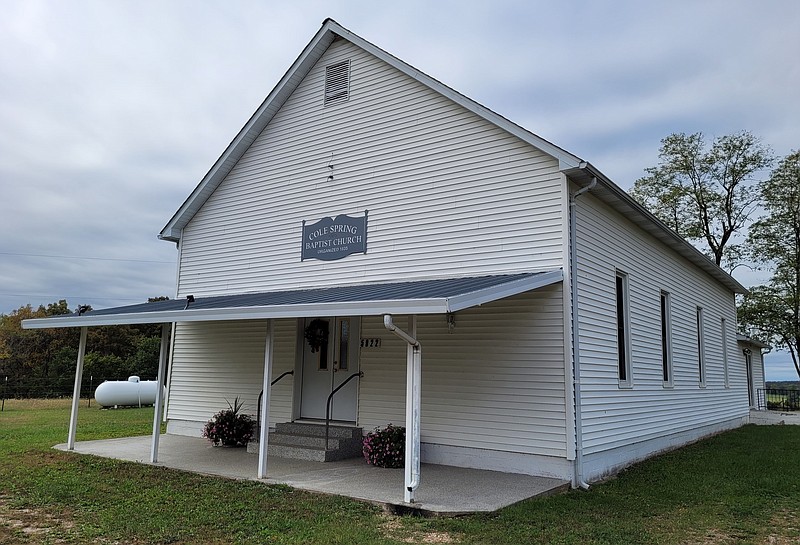In 1831, the pioneering families of Enoch Enloe Sr. and Lamon Short decided to settle near the area that eventually became Russellville after a wheel on one of their covered wagons broke.
Four years later, several families gathered on a nearby farm to establish the first church in the community. The Baptist congregation later moved to an area known as Belleville and helped establish several churches in the area.
A handwritten church record notes that on June 27, 1835, local settlers met to formalize the formation of a congregation that would initially be known as Cold Spring Baptist Church, receiving its name from a spring in the area.
The record states, “Agreeable to a previous appointment, a number met at Brother (Jacob) Sawders for the purpose of entering into a church covenant. As we believe that the scriptures plainly hold to view that prosperity of God’s people living together in a church covenant, by giving ourselves to each other and the Lord.”
It was at this meeting that 15 “Articles of Faith” and 12 “Rules of Decorum” were adopted for the fledgling church, and signed by John A. Langdon, Levi Roark, James Marcy, William Small and Louis Shelton.
In an article written by Bruce Murphy and published in the Russellville News on Nov. 2, 1978, he explained, “The first church was erected on a farm now owned by Mr. George Rhodes. The building faced the south and had two doors on the south, one for the men and one for the women.”
Murphy further explained that the original church building had one door on each end where African-Americans, during a time associated with slavery and segregation, entered the building and worshiped alongside others from the community.
Three years after the church’s founding, in 1838, the nearby town of Russellville came into existence after it was surveyed by land promoter and storekeeper Buckner Russell.
The period of the Civil War was unnerving for many living in the vicinity of the church since many joined companies of the Enrolled Missouri Militia in support of the Union while bushwhacker activity remained a constant threat. The role of the war on the condition of the congregation is uncertain because there are no church records from this period.
“So much information we have is from family records of the descendants of the charter members,” a written note in one of the church’s history books reveals.
Oral histories handed down through the generations state the records from 1835-1883 perished in a fire with no further details available. However, many businesses in nearby downtown Russellville burned to the ground in a major fire in 1883, and it is believed the records may have been held there in one of the businesses owned by a church member.
The church became inspirational in the establishment of other church bodies, with Pleasant Hill being organized by Cold Spring Church in 1881. Several years later, 1888, Mount Olive Baptist Church south of Russellville was established through the assistance of members of Cold Springs.
“In 1889, the present site was chosen and a new building began,” church records reveal. “Part of the old building was used in the construction of the (new) building.” The records add, “The building was completed in May 1890 and was dedicated September 28, 1890.”
The site for the new church building was located within the fading community of Belleville on property donated by Andrew Jackson Leslie. The name of the church was eventually changed to Cole Springs Baptist Church, inspired by its location within Cole County. As a gift for Cole Spring’s new location, First Baptist Church in Jefferson City donated their pulpit to the congregation.
Belleville, which was established around 1880 with hopes the railroad would build a depot there, was located along state Highway V and once boasted a blacksmith shop, general store and houses. The town failed to grow when the railroad depot was instead established in nearby Russellville.
The rural church made headlines in the St. Louis Post Dispatch on Oct. 4, 1897. It was reported, “Two young men nearly 21 years old … are locked in jail under the fines of $25 and costs each for being drunk and disturbing religious worship at Cole Spring Baptist Church near Russellville….”
The newspaper added, “The preacher had them arrested and they pleaded guilty in Justice court. Their parents refused to pay their fines because they thought the boys needed punishing.”
Throughout the next several years, services continued without major distraction and the congregation helped establish Russellville Baptist Church in 1903 followed by Corticelli Baptist Church in 1905.
There is a pause in church records from the period of early October 1918-April 1919, revealing a suspension in monthly business meetings and worship services. It was during this period in U.S. history that not only did World War I come to an end, but the spread of the Spanish Flu inspired worldwide closures of houses of worship.
On Aug. 29, 1937, Cole Spring held its centennial celebration (two years late), which had an attendance estimated at more than 500 people. The principal speaker at the celebration was Congressman William Lester Nelson, a native of Bunceton.
Theological author Eddie Gibbs wrote, “Old churches must not simply stand as monuments to the past but as spiritual grandparents that have invested in the future by passing on their life to others and releasing their offspring to form new congregations.”
Cole Spring Baptist Church, though a small congregation, has weighed mightily with regard to its spiritual influence throughout the decades by helping establish other congregations. Her doors, though creaking with a little age, remain open to the community and continue to welcome all to worship just as she has for nearly two centuries.
Jeremy P. Ämick is writing a series of articles highlighting the history of the Russellville area in honor of Missouri’s bicentennnial.

